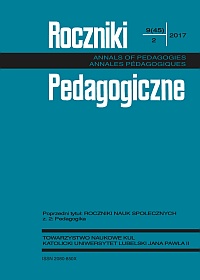Ill Children's Perception of Health Value. Research Conducted in Hospital Scholl in Puławy
Main Article Content
Abstract
The aim of the present paper is to analyse the ill children’s perception of health value.
Chronic illnesses are increasingly frequent not only amongst adults, they affect children as well. Such a situation has a detrimental impact on children’s mental life due to prolonged stress, which impair their ability to self- regulate and adapt. The attitudes that they adopt oftentimes display low self- esteem, children are convinced of their unprepossessing appearance and bad psycho- physical fitness. All this causes insecurity, indecisiveness, frustration and deprivation of needs. Long-lasting frustrative situations induce negative emotional reactions and lead to mental imbalance. The perception of one’s own illness is related to the period in which it occurred. If it commences in early childhood, it becomes a part of child’s life; in late childhood it triggers anxiety, anger and stress. Very often it hinders the realization of personal life goals and achieving success at school, in addition to that, educational difficulties arise and contact with peers is limited. The impact of illness on the development of an individual involves numerous stages, in which each stage results from the previous one and prepares for the following one. A necessary requirement for effective treatment of such special patients is to ensure the best adaptation conditions for inpatients. Being ill is one of many “activities” filling their life. In the time between malaise, they talk play, read, draw, argue and reconcile. They love and want to be loved. In this respect, they do not differ from their healthy peers. Shaping the attitudes toward illness is a slow and time-consuming process. Attitudes that we adopt stem from inviduall experience, emotional experience and perception of information. The only thing that causes more difficulties for them is everyday functioning, since it demands greater maturity, effort and responsibility.
Article Details
References
Borzucka-Sitkiewicz K., Promocja zdrowia i edukacja zdrowotna, Kraków: Oficyna Wydawnicza IMPULS 2006.
Cekiera Cz., Psychoprofilaktyka uzależnień oraz terapia i resocjalizacja osób uzależnionych, Lublin: TN KUL 1993.
Chałas K., Moc wychowawcza przypadkowych zdarzeń w świetle introcepcji wartości, Kielce– Lublin: Wydawnictwo Jedność 2011.
Heszen I., Sęk H., Psychologia zdrowia, Warszawa: Wydawnictwo Naukowe PWN 2008.
Lamczyk D., Pojęcie zdrowia i zachowań zdrowotnych, „Lider” 2013, nr 8.
Rynio A., Integralne wychowanie w myśli Jana Pawła II, Lublin: Wydawnictwo KUL 2004.
Sen A., Rozwój i wolność, tłum. J. Łoziński, Warszawa: Zysk i S-ka 2002.
Tobiasz-Adamczyk B., Wybrane elementy socjologii zdrowia i chorób, Kraków: Wydawnictwo Uniwersytetu Jagiellońskiego 2000.
Wiśniewska J. (red.), Sytuacje graniczne w biegu ludzkiego życia, Radom: Wydawnictwo Naukowe Instytutu Technologii Eksploatacji – Państwowy Instytut Badawczy 2015.
Wolny B., Edukacja zdrowotna w szkole, Stalowa Wola: Wydawnictwo Diecezjalne i Drukarnia w Sandomierzu 2010.
Woynarowska B., Edukacja zdrowotna. Podręcznik akademicki, Warszawa: Wydawnictwo Naukowe PWN 2012.
